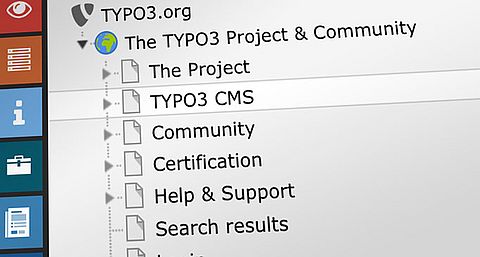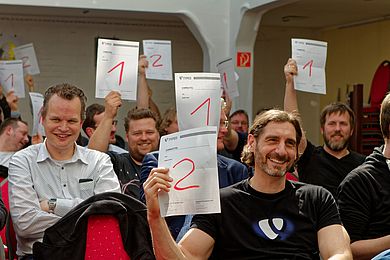Tuesday was the first day of the 9th International TYPO3 conference. A conference that is very different from the previous ones, because of the themed nature of the days. The first day was dedicated to community. A topic that kept your own community manager busy the whole day and of course the days before preparing presentations for on the conference.
Day: October 29, 2013
TYPO3 conference – Community Day
Leslie Hawthorn started the Community Day with a talk about the work of a community manager and specifically keeping secrets, which she calls the dance of community leadership. Leslie was the perfect start of the community day with all the knowledge she shared about community and leadership in a community. We asked Leslie a few question she answers in the mini-interview at the bottom of this interview.
Also we were very pleased to receive guests outside of the TYPO3 ecosystem from Joomla, Elasticsearch, OSI, CMS garden, Sitecore, Symfony and Zend on this day.
The Community Day featured 4 different tracks, Non-Tech, Outside of the Box, TYPO3 and TYPO3 Association/structure.
The first time in the history of TYPO3 conferences also new formats besides the established talks were introduced to the audience.
A Pecha-Kucha session offered the opportunity to four different speakers to talk for 20 slides, showing for 20 seconds each. This format covered topics from various community aspects and issues up showing new chances how to evolve in future.
 PechaKucha: Donation Super Hero by Sven Ditz. Picture by Riona Kuthe
PechaKucha: Donation Super Hero by Sven Ditz. Picture by Riona Kuthe
Also a Fishbowl discussion started with five participants talking about different ways how to motivate the community. During this session a guest chair giving the chance for speakers to leave the Fishbowl at any point of discussion and offering their chair to speakers from the audience.
Furthermore, in a good tradition, the presentation of the different kinds of TYPO3 teams proceeded during the afternoon, followed up by the presentation of the four biggest TYPO3 Budget Applications for the upcoming year 2014.
At the end of the day a panel discussion was held about Next Level CMS. The main question was what is the next important thing regarding content management. TYPO3 CMS is currently very focused on the Web. How can content be handled and not only for the web? The editor experience was an important topic as well. With the decoupled approach towards the abstraction of content different user interface for different devices could be achieved. It came as a surprise that the Joomla backend is largely responsive currently and based on bootstrap.
 Dominik Bader (Sitecore), Joey Hasenau (Cybercr@ft), Christopher Hlubek (Network Team, Neos Team), Rasmus Skjoldan (MOC, Neos Team), Brian Teeman (Joomla) - Picture by Riona Kuthe
Dominik Bader (Sitecore), Joey Hasenau (Cybercr@ft), Christopher Hlubek (Network Team, Neos Team), Rasmus Skjoldan (MOC, Neos Team), Brian Teeman (Joomla) - Picture by Riona Kuthe
Interview with Leslie Hawthorn
You are a community manager with a history. Can you tell us a little bit about that and what your current situation is?
 I stumbled into the Community Management professions almost 8 years ago while at Google, where I managed the Summer of Code program from 2006-2010. When I started in this role, I'd never been on a public mailing list. From those humble beginnings, I've been able to contribute to a variety of open source projects with needs on the community enablement front, including CASH Music, the Priv.ly Foundation and the Sahana Software Foundation.
I stumbled into the Community Management professions almost 8 years ago while at Google, where I managed the Summer of Code program from 2006-2010. When I started in this role, I'd never been on a public mailing list. From those humble beginnings, I've been able to contribute to a variety of open source projects with needs on the community enablement front, including CASH Music, the Priv.ly Foundation and the Sahana Software Foundation.
I'm currently the Community Manager for Elasticsearch Inc, the company behind the Elasticsearch, Kibana and Logstash open source projects. I joined the organization in August and just moved to Amsterdam to work from their European HQ. At Elasticsearch, I work on a variety of projects including empowering our community members to share knowledge at local meetups.
Community is hard to measure, but it is getting to be more of a science. What are the current developments regarding this topic?
There are a few folks working on projects to measure community, though I admit I have yet to see any solution that I think truly captures the health and well-being of a particular community. Knowing a community is healthy is a matter of having experience with that group of individuals, understanding what their needs are and how many of those needs are being met well/decently/poorly. For those folks interested in tools for this process, I'd recommend:
The open source metrics working group, a list is for discussing the what, how, and why of gathering and analyzing metrics about communities that practice the open source way. For example, free/libre/open source software (FLOSS) projects. <link http: www.theopensourceway.org mailman listinfo metrics-wg>
www.theopensourceway.org/mailman/listinfo/metrics-wg
Open Source Community Metrics: Tips and Techniques for Measuring Participation, a presentation by Dawn Foster at LinuxCon Europe 2012: <link http: events.linuxfoundation.org images stories pdf lceu2012_foster.pdf>
events.linuxfoundation.org/images/stories/pdf/lceu2012_foster.pdf
David Eaves' work measuring the health of the Mozilla community via a metric collection dashboard, <link http: eaves.ca developing-community-management-metrics-and-tools-for-mozilla>
eaves.ca/2011/04/07/developing-community-management-metrics-and-tools-for-mozilla/
I admit to being biased in favor of "taking the community's temperature" by being deeply ingrained in it, but tools are useful things to measure if the person taking the temperature is suffering from bias in their findings.
Open Source is a model that we see being used outside of the software area as well and being applied to local communities. In what way is this developing and in what way can we benefit from each other?
Wow, this question has so many great answers, so I will stick to one. I am particularly excited about the open source way being rekindled in the agricultural community, specifically urban agriculture and local food production. Where my grandparents would have known how to collect seeds, exchanged them with their neighbors and grown a decent amount of their own fruits and vegetables themselves, these skills are largely absent amongst my peers and folks younger than me. For a variety of reasons, the art of personal resilience has diminished in our society, and the sharing of knowledge and literally life giving objects and materials along with it.
As more and more folks are taking an interest in urban agriculture, a variety of projects are blossoming in an open source way:
Resurgence of community gardens to provide locally grown foods, often to care for members of the local community who lack sufficient funds to adequately feed themselves and their families. These gardens are often in "reclaimed" spaces that are in disrepair, going from eyesore to productive land through shared labor and knowledge.
The Grow Stuff open source project has sprung up to help you learn about growing food, track what you plant and harvest, and swap seeds and produce with other gardeners near you. These folks also provide mentorship to newbies wanting to learn basic programming skills. Very cool stuff: growstuff.org
Artists have begun creating works to educate their communities about urban edibles and medicinal plants found in their own backyards, sharing not only beauty with their neighbors but valuable knowledge. This idea has had particularly good play in areas where people lack sufficient resources to obtain traditional/Western medical care. Here's an example from my former home town of Portland, Oregon, US: ghosttide.com/plants-around-us-mural
I have too many examples to list them all, but I am so glad to see that we're applying the open source way to activities that were, in my opinion, once fundamentally "open source" - lacking a central control point or single point of failure and in which each member of the community can create value and derive benefit from others' contributions.
What are your recommendations to the TYPO3 community?
I've been incredibly impressed with my interactions thus far, though I will echo a sentiment I've heard in the hallway track a few times: the TYPO3 community is not particularly well known outside of Germany. I would never have known about TYPO3 had I not gotten to know the project as part of Summer of Code. You folks have a wonderful set of individuals contributing and a solid code base, so whatever work you might do to let a wider group of people know about the work you are doing would be wonderful. One suggestion I heard was to hold TYPO3 Cons in other countries, and I'd add a +1 to that idea.


 I stumbled into the Community Management professions almost 8 years ago while at Google, where I managed the Summer of Code program from 2006-2010. When I started in this role, I'd never been on a public mailing list. From those humble beginnings, I've been able to contribute to a variety of open source projects with needs on the community enablement front, including CASH Music, the Priv.ly Foundation and the Sahana Software Foundation.
I stumbled into the Community Management professions almost 8 years ago while at Google, where I managed the Summer of Code program from 2006-2010. When I started in this role, I'd never been on a public mailing list. From those humble beginnings, I've been able to contribute to a variety of open source projects with needs on the community enablement front, including CASH Music, the Priv.ly Foundation and the Sahana Software Foundation.



